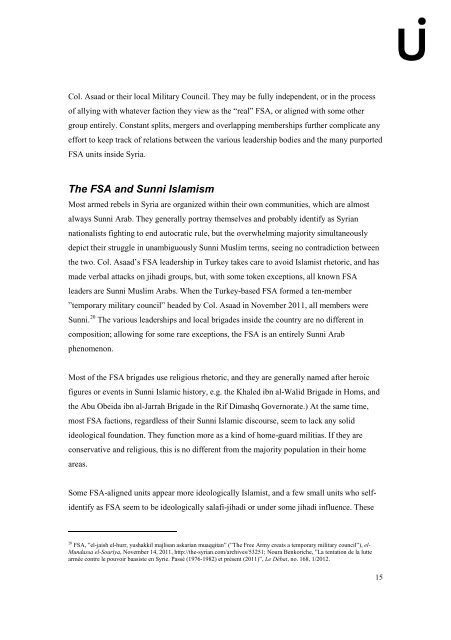You also want an ePaper? Increase the reach of your titles
YUMPU automatically turns print PDFs into web optimized ePapers that Google loves.
Col. Asaad or their local Military Council. They may be fully independent, or in the process<br />
of allying with whatever faction they view as the “real” FSA, or aligned with some other<br />
group entirely. Constant splits, mergers and overlapping memberships further complicate any<br />
effort to keep track of relations between the various leadership bodies and the many purported<br />
FSA units inside Syria.<br />
The FSA and Sunni Islamism<br />
Most armed rebels in Syria are organized within their own communities, which are almost<br />
always Sunni Arab. They generally portray themselves and probably identify as <strong>Syrian</strong><br />
nationalists fighting to end autocratic rule, but the overwhelming majority simultaneously<br />
depict their struggle in unambiguously Sunni Muslim terms, seeing no contradiction between<br />
the two. Col. Asaad’s FSA leadership in Turkey takes care to avoid Islamist rhetoric, and has<br />
made verbal attacks on jihadi groups, but, with some token exceptions, all known FSA<br />
leaders are Sunni Muslim Arabs. When the Turkey-based FSA formed a ten-member<br />
”temporary military council” headed <strong>by</strong> Col. Asaad in November 2011, all members were<br />
Sunni. 20<br />
The various leaderships and local brigades inside the country are no different in<br />
composition; allowing for some rare exceptions, the FSA is an entirely Sunni Arab<br />
phenomenon.<br />
Most of the FSA brigades use religious rhetoric, and they are generally named after heroic<br />
figures or events in Sunni Islamic history, e.g. the Khaled ibn al-Walid Brigade in Homs, and<br />
the Abu Obeida ibn al-Jarrah Brigade in the Rif Dimashq Governorate.) At the same time,<br />
most FSA factions, regardless of their Sunni Islamic discourse, seem to lack any solid<br />
ideological foundation. They function more as a kind of home-guard militias. If they are<br />
conservative and religious, this is no different from the majority population in their home<br />
areas.<br />
Some FSA-aligned units appear more ideologically Islamist, and a few small units who selfidentify<br />
as FSA seem to be ideologically salafi-jihadi or under some jihadi influence. These<br />
20 FSA, ”el-jaish el-hurr, yushakkil majlisan askarian muaqqitan” (”The Free Army creats a temporary military council”), el-<br />
Mundassa el-Souriya, November 14, 2011, http://the-syrian.com/archives/53251; Noura Benkoriche, ”La tentation de la lutte<br />
armée contre le pouvoir baasiste en Syrie. Passé (1976-1982) et présent (2011)”, Le Débat, no. 168, 1/2012.<br />
15





